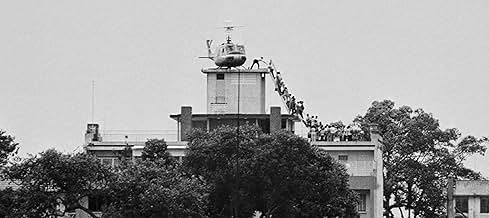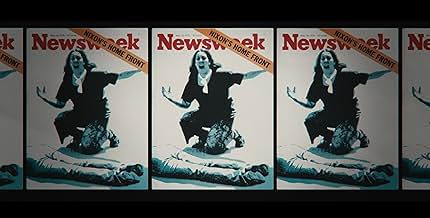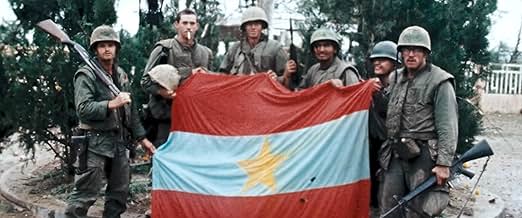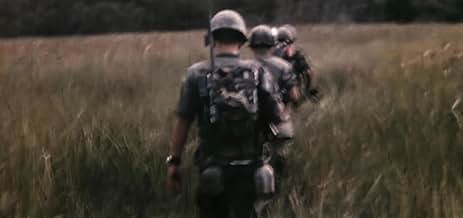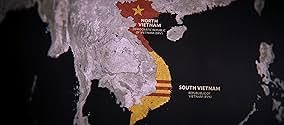Turning Point: La guerre du Vietnam
Titre original : Turning Point: The Vietnam War
- Mini-série télévisée
- 2025
- 1h 15min
Les effets profonds de la guerre du Vietnam sur l'identité américaine, provoquant des divisions sociales et érodant la confiance du gouvernement. Plus qu'une défaite militaire, elle a transf... Tout lireLes effets profonds de la guerre du Vietnam sur l'identité américaine, provoquant des divisions sociales et érodant la confiance du gouvernement. Plus qu'une défaite militaire, elle a transformé la politique et la culture des États-Unis.Les effets profonds de la guerre du Vietnam sur l'identité américaine, provoquant des divisions sociales et érodant la confiance du gouvernement. Plus qu'une défaite militaire, elle a transformé la politique et la culture des États-Unis.
Parcourir les épisodes
Avis à la une
After Ken Burns' magisterial and monumental 18-hour deep dive into the Vietnam War, you'd think there'd be nothing left to say. But "Turning Point: The Vietnam War" on Netflix proves there's still room for new voices, especially from both North and South Vietnam, that bring fresh, essential perspectives to this complex and chaotic chapter of history. The series is balanced, detailed without dragging, and as harrowing as any account of America's decades-long misadventure. Fifty years after the fall of Saigon, this story remains urgent and deeply unsettling. Like Brian Knappenberger's earlier "Turning Point" series on 9/11 and the Cold War, it's clear-eyed, unflinching, and committed to telling the truth, warts and all. It's definitely a worthy watch.
There have been many excellent TV/streaming series on the Vietnam War and this is another. To be clear, the big events of the war, especially from the years 1965 to 1973 were amply addressed by the other series and the only thing different about this one is some of the interviewees are new.
Where the series adds something new is at the beginning and end of the conflict. The description of the early 20th century developments and the Kennedy years contained some material I don't remember from other series. Ditto for the period after the Paris Peace Treaty. For example, a representative of the Communists admitted they went too far in their postwar purge of the former South Vietnam. I don't remember the other series showing expressions of doubt or regret by the Communists. I think this speaker's regrets could be expressed more freely because relations between the US and Vietnam are so much better today.
Finally, I'm a little surprised that other reviewers suggest the series only shows the American perspective, the series interviews many Vietnamese from both sides of the conflict. While I think the series is perhaps it little more generous to some American critics of the war then they should have been, I don't get the criticism of Dan Rather's inclusion. He was covering the war throughout the entire period of heavy American involvement. He is certainly very critical of the effort in retrospect, but I suspect he was like Walter Cronkite and millions of other Americans in thinking it began as a noble cause.
Where the series adds something new is at the beginning and end of the conflict. The description of the early 20th century developments and the Kennedy years contained some material I don't remember from other series. Ditto for the period after the Paris Peace Treaty. For example, a representative of the Communists admitted they went too far in their postwar purge of the former South Vietnam. I don't remember the other series showing expressions of doubt or regret by the Communists. I think this speaker's regrets could be expressed more freely because relations between the US and Vietnam are so much better today.
Finally, I'm a little surprised that other reviewers suggest the series only shows the American perspective, the series interviews many Vietnamese from both sides of the conflict. While I think the series is perhaps it little more generous to some American critics of the war then they should have been, I don't get the criticism of Dan Rather's inclusion. He was covering the war throughout the entire period of heavy American involvement. He is certainly very critical of the effort in retrospect, but I suspect he was like Walter Cronkite and millions of other Americans in thinking it began as a noble cause.
Some comments are unfair to say that the series presented Ho Chi Minh as a leader who only wanted to turn Viet Nam communist. Very early on (I think latter part of Ep 1 or Ep 2 onwards), they narrated how Ho Chi Minh banked on the USA history's of struggle for independence against Great Britain, and hoped that the US would likewise support Viet Nam's fight against the French. It also recognized that in Viet Nam, the war was known as an "American War" instead of "Vietnam War", acknowledging the dominant US-centric perspective in calling it the latter.
For the most part, I found this documentary balanced, only because when I find myself sympathizing (?) with one side, it would give another perspective that makes you realize that none of those involved were innocent - they all have blood on their hands for having no regard for non-combatants/civilians. It's materials like this that give us a chilling reminder that war is never the answer.
For the most part, I found this documentary balanced, only because when I find myself sympathizing (?) with one side, it would give another perspective that makes you realize that none of those involved were innocent - they all have blood on their hands for having no regard for non-combatants/civilians. It's materials like this that give us a chilling reminder that war is never the answer.
I have been a Netflix subscriber for years and years and this has to be the best documentary I have ever seen. It is so thoughtful and through, and honest.
I remember sitting in the high school auditorium with all the other male seniors to sign up for the Selective Service in 1972. The representative where really honest with us. It was during the time when the draft was based on the lottery system. They told us if your number was 100 or less, you would be drafted, if it was about 100, no worries. Mine was in 343.
I had to possibility of participating in history, but too dimwitted to understand what it meant.
Now I know, and the knowing makes me feel ashamed for our country.
Best line in the documentary is "We are the United States of Amnesia". Ain't it so, all you can do is weep.
This is a must watch, even for people that do not live in this country.
I remember sitting in the high school auditorium with all the other male seniors to sign up for the Selective Service in 1972. The representative where really honest with us. It was during the time when the draft was based on the lottery system. They told us if your number was 100 or less, you would be drafted, if it was about 100, no worries. Mine was in 343.
I had to possibility of participating in history, but too dimwitted to understand what it meant.
Now I know, and the knowing makes me feel ashamed for our country.
Best line in the documentary is "We are the United States of Amnesia". Ain't it so, all you can do is weep.
This is a must watch, even for people that do not live in this country.
There is no new insight here, and if you're familiar with the Ken Burns series, this is the lackluster remake. It duly covers the various turning points, from French loss to Tet to scuttled peace talks and Nixon's genocidal campaigns to name a few. We get various asides along the way; the student anti-war movement, the elections of '68, the treatment of returning veterans.
If it's your first comprehensive surveying of the Vietnam story, you will get the whole thing. It is, as usual, told from the American perspective; ill-advised entanglement in a faraway jungle, increasingly bitter and chaotic. There are also some Vietcong voices this time around.
There's so much that went wrong in a decade that to survey as we do, with talking heads, and condensing to snippets, makes it seem self-evident. There's no way to tell what a world would look like in which the CIA didn't lose the plot probably starting with Cuba, for example, or 'domino effect' thinking didn't win over in policy circles. And it's important to note how badly Washington misunderstood context; the generals did really think in terms of fighting in the Pacific Theater, but there the troops had been propelled by Pearl Harbor and fighting the good fight.
If it's your first comprehensive surveying of the Vietnam story, you will get the whole thing. It is, as usual, told from the American perspective; ill-advised entanglement in a faraway jungle, increasingly bitter and chaotic. There are also some Vietcong voices this time around.
There's so much that went wrong in a decade that to survey as we do, with talking heads, and condensing to snippets, makes it seem self-evident. There's no way to tell what a world would look like in which the CIA didn't lose the plot probably starting with Cuba, for example, or 'domino effect' thinking didn't win over in policy circles. And it's important to note how badly Washington misunderstood context; the generals did really think in terms of fighting in the Pacific Theater, but there the troops had been propelled by Pearl Harbor and fighting the good fight.
Le saviez-vous
- AnecdotesAired on the 50th anniversary of the Fall of Saigon.
Meilleurs choix
Connectez-vous pour évaluer et suivre la liste de favoris afin de recevoir des recommandations personnalisées
Détails
- Date de sortie
- Pays d’origine
- Langue
- Aussi connu sous le nom de
- Turning Point: The Vietnam War
- Société de production
- Voir plus de crédits d'entreprise sur IMDbPro
- Durée
- 1h 15min(75 min)
- Couleur
Contribuer à cette page
Suggérer une modification ou ajouter du contenu manquant



